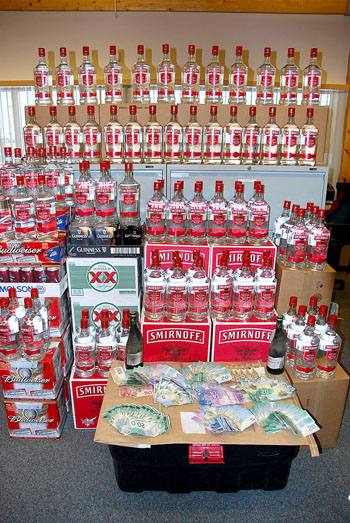Nunavut’s new policy on liquor: reduce the harm
No plan for residential treatment centre in Nunavut

The Government of Nunavut wants to wean people away from the binge drinking of large quantities of vodka and encourage the moderate drinking of products like wine and beer, as part of its harm reduction approach to the management of liquor. The plan was produced by four GN departments: Finance, Health, Family Services and Justice. (FILE PHOTO)
As part of its shift from prohibition to harm reduction policies on liquor, the Government of Nunavut has released a 15-point action plan aimed at limiting the grievous harm caused by alcohol consumption in Nunavut.
Finance Minister Keith Peterson tabled the document Nov. 8, when the recent fall sitting of Nunavut’s legislative assembly drew to a close.
“The Government of Nunavut is committed to help reduce and limit the harms related to alcohol in Nunavut,” the GN said in what looks like a one-sentence mission statement at the start of the plan, produced by four GN departments: Finance, Health, Family Services and Justice.
But in it, the Nunavut residents will not find a commitment to build a residential substance abuse treatment centre in the territory.
Instead, the GN plans to offer a mix of services that for some people could include residential treatment outside Nunavut.
“When necessary, the government looks to specialized services available outside of Nunavut to meet an individual’s specific needs. Examples include telehealth consultations, residential treatment programming, and other inpatient services,” the plan said.
But most of the GN’s emphasis is on community-based services, including where such services already exist.
The plan makes repeated use of the phrase “culturally appropriate” to describe the kinds of services it offers now and wants to offer in the future.
That includes using community clinicians, such as the 10 additional nurse practitioners and the 56 mental health and addictions workers they plan to hire over the next three years.
“In the realm of alcohol harm reduction, these services are intended to: help with recovery; reduce the likelihood and severity of relapse; and, facilitate reintegration of individuals into a supportive community,” the plan says.
The GN also said it will “enhance opportunities” for culturally-relevant training, including the training of local counsellors and volunteers, but gives few specifics on when or how that will happen.
The plan builds on ideas contained in the 2012 report of a task force, with representatives from Nunavut Tunngavik Inc., that the GN set up to review the Liquor Act.
That’s the report that recommended experimenting with beer and wine stores to change the territory’s binge drinking culture and take business away from bootleggers.
“Many [Nunavut residents] described a healthier community as one where the drinking culture has changed and alcohol-related harm has been significantly reduced…,” the plan said.
To that end, the GN plans actions aimed at changing the way people consume alcohol.
Much of that seems to involve the production and distribution of brochures, posters and “multi-media advertising products.”
They also propose “resource materials” for alcohol education committees in the communities and more training for alcohol education committee members.
And another action is already underway: the opening of an experimental beer and wine store in Iqaluit. In a plebiscite held in April 2015, 78 per cent of voters said yes to that idea.
“A closely-monitored pilot beer and wine store in Iqaluit will enable government to determine impacts on the community (positive and negative) of providing liberalized access to lower alcohol content liquor, and encourage sound decision-making about the effectiveness of this approach in reducing the harms related to alcohol use for Nunavummiut,” the action plan says.
In addition to easier access to wine and beer, the GN also promises to use enforcement to go after bootleggers and impede access to illegal supplies of hard liquor.
That includes:
• adopting the Unlawful Property Forfeiture Act, which would zap bootleggers by allowing the GN to seize their property;
• cracking down on impaired drivers by setting a maximum blood alcohol level of zero for novice drivers;
• tightening up the alcohol import permit system to reduce fraud; and,
• providing more support for the RCMP.
While acknowledging the harm that alcohol causes in Nunavut, the report also said that the proportion of Nunavut Inuit who do not drink is much higher than the proportion of Canadians who do not drink.
It cites the last Inuit health survey, which showed that 41 per cent of Inuit aged 15 and older had not consumed alcohol in the previous year prior to being surveyed, compared with 23 per cent for all Canadians.
Taking Steps to Reduce Alcohol Related Harm in Nunavut by NunatsiaqNews on Scribd





(0) Comments